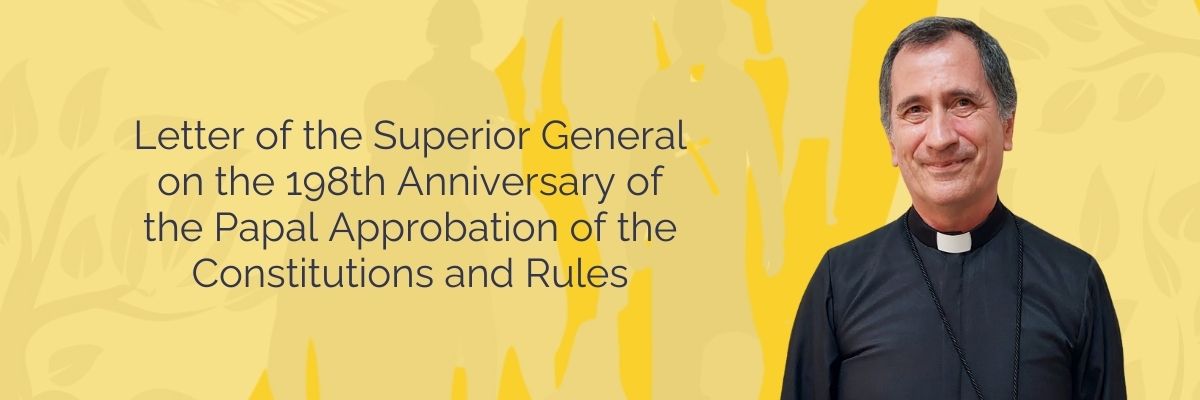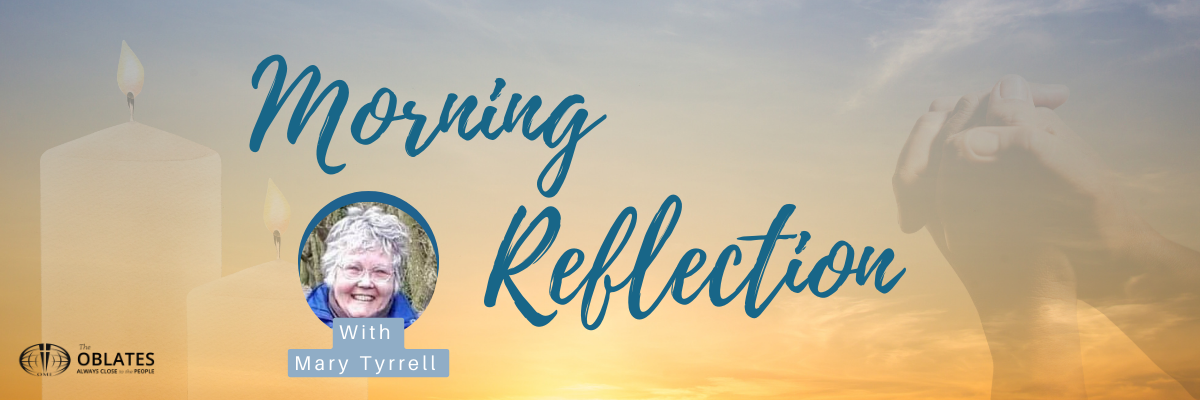Oblate News
Letter of the Superior General on the 198th Anniversary of the Papal Approbation of the Constitutions and Rules Letter of February 17, 2024 Pilgrims radiating our common charism LJC et MI

San Antonio (Texas), February 17, 2024
Dear Oblates and members of our charismatic family.
In two years, God willing, we will be celebrating the 200th anniversary of the pontifical approval of the Constitutions and Rules and the Congregation of the Missionary Oblates of Mary Immaculate, just after living the Jubilee of 2025. Both events will help us to continue our pilgrimage in communion as missionaries of hope. In my previous letters, listening to the appeals of the last General Chapter, I recalled our commitment to care for our common home: our Mother Earth and our charismatic family. Today I would like to renew our commitment to go on pilgrimage with the laity who share the charism to continue taking steps in the direction proposed by the Chapter and the Second Congress of Lay Oblate Associations.
“May we understand well what we are!” wrote St. Eugene de Mazenod to his companions from Rome, commenting on the pontifical approbation of the Congregation and its new name: Missionary Oblates of Mary Immaculate. In these 200 years of history, every Oblate, every layman and laywoman, consecrated men and women of our family, has helped us to better understand the beauty of our charism. Each one of us who live it today brings a new ray of light that radiates in the world, a new face of this marvelous polyhedron that is this charism given by the Holy Spirit to the Church and to the world to announce the Gospel of Jesus and his Kingdom to the most abandoned.
In these years, especially since the beatification and canonization of Eugene de Mazenod, the laity have played a very important role. Their passion for the charism and mission has helped us to try to live it more purely, has generated a new enthusiasm and has provoked a charismatic expansion in new associations and forms of Christian life. We now better understand the responsibility of each one of us to enrich and safeguard the inheritance that the Spirit has bequeathed to us in St. Eugene.
Reading this story from the different expressions in which the charism is incarnated, I feel a call to conversion and discernment. Conversion to better live this gift of the Holy Spirit that is very much alive and is transforming the lives of many people for the good of the Church, for the good of the poor. This gift of the Spirit needs to be discerned and incarnated more strongly in me, in us. Where is the Spirit leading us? I would like to propose three steps that can help conversion and discernment.
First of all, we are called to acknowledge by giving thanks: how good it is for us to discover and recognize in others the same gift that I have received! To recognize also that the gift of the Spirit is much greater than my group, congregation, institute or association. Recognizing ourselves in the same charism leads us to give thanks to God for the gift he has given us and also for the gift that is the other and the gift that is each group that incarnates it. This thanksgiving opens our hearts to receive more light, to deepen our sense of belonging, to allow ourselves to be inspired by others and to know better what we are through the eyes of God.
Learning. This recognition leads me to learn the charism from others because what they have received belongs to me and helps me to live it better. An experience lived in September 2023 illustrates this second step. The Oblate Missionary Sisters of Mary Immaculate were closing their 25-year Jubilee with a Congress that they themselves convoked and whose theme was “the feminine genius of the charism”. The women who participated, lay and consecrated, shared what they live on a daily basis. A current of joy filled everyone as we learned from them something that belonged to all of us and that at the same time encouraged us to live our personal vocation better. How much we have to learn from the women who live the charism! How much we have to learn from each other to live our mission with the poor like them, from the merciful heart of Jesus that St. Eugene incarnated! How much we have to learn from each other to live our common vocation and mission better!
Create common spaces and moments. This is the third step. We need moments and structures to recognize ourselves as brothers and sisters in the charism. We need to celebrate our common charism giving thanks to God and to those who incarnate it. We need to create formation cells to learn our charism from the history and experience of other groups and ways of life. We need to discern together our common mission. The Second Lay Congress and the 37th Chapter propose several actions that I invite us to put into practice at all levels: local, national, regional and global. What else can we do?
On December 8, 2023, I shared with you a dream: the dream of sitting at charismatic round tables, convoked by Mary and inspired by the synodal dynamic. Tables where all the expressions of the charism can sit together with the poor to share and discern the next steps of our pilgrimage. There we will be able to recognize each other as brothers and sisters in the charism, give thanks to God, learn from each other and decide what structures of coordination we want to give ourselves. My dream is to see this in all the local communities and to expand it to the national, regional, global level. Let us begin by reading together the materials of the Second Lay Congress and “Pilgrims of Hope in Communion”. Let us learn together to walk together, discerning the signs of the times and the inspirations of the Spirit.
Some express the fear that the great diversity among the groups in our charismatic family will paralyze us. Certainly the Holy Spirit has been very creative with us and the diversity he has given us is good. By listening together to the Spirit we will find ways to harmonize this diversity. The younger ones can illuminate this path that they have already traveled in recent years. Other experiences within and outside our family can also help us. This discernment should be done from the point of view of solidarity and subsidiarity. Solidarity invites us to share what we are and what we have with everyone, starting with the most vulnerable. Subsidiarity makes us respect the autonomy of each group and asks us to empower everyone so that they can make their own decisions without paternalistic dependencies. Respecting these principles we will find what we need to grow in missionary communion.
My concern is another: falling into “charismatic self-referentiality”. It is a temptation that we must reject. We could be so busy discussing our identity, our history, the criteria to say who does or does not belong to our charism that we stagnate ourselves in a self-referential dynamic. We were born to respond to the most urgent needs of the Church, to be and to announce the Gospel to the most abandoned. Our common pilgrimage will be good if it bears fruit, that is, if it leads us to a more evangelical life and makes us better missionaries to the poor. It will be good if it brings us into closer communion with the Church and in her with the other charisms that the Spirit has given to the world. The laity are called to be the leaven of the Beatitudes in our world as the leaven of universal fraternity. Reading our documents we see that the laity have been invited to be present in the media, the ministry of JPIC (Fratelli Tutti and Laudato Si) and the defense of life and the family. May our charism radiate in our mission to the poor!
Layman Stefano Dominici, a member of the MAMI in Italy, has been appointed Coordinator of Lay Associates and Associations. He is already working with other lay people from the five Oblate regions and some Oblates in the wonderful task of weaving an ever-widening network of lay people and associates of our family, a network that will facilitate communication and help us to develop proposals with which to move forward. I have asked Stefano to write us a letter in which he will tell us what he needs. From his proposals we hope to generate new life and grow in our communion, formation and mission. I ask all of us, Oblates and laity, to respond generously to his suggestions. I also ask the laity to think about how they want to relate to each other, to the Oblates and to the other forms of consecrated life that want to join the charismatic round tables.
I would now like to mention the two lay people beatified with our Oblate martyrs: Blessed Candido Castan and Blessed Paul Thoj Xyooj. Both of them, associated with the Oblates through martyrdom, gave the highest witness of love. Candido Castan encourages us to live in our families the Gospel spirit and to be aware of our responsibility in society: besides having a life of intense piety, he was a union leader, participated in political life and promoted the dignity of the workers by also giving witness to the Gospel in his work place. Paul is an example of missionary collaboration, taking his ministry as a catechist to its ultimate consequences and defending the missionaries to the point of death. Both are beautiful, complementary examples of the mission of the laity in the Church and in the world. To both Blesseds I ask their intercession so that all our charismatic family may announce the Gospel with their lives, being missionaries with the poorest.
May the Lord bless us all, pilgrims of hope in communion.
Your brother and pilgrim,
Luis Ignacio Rois Alonso,
OMI Superior General
Recent news
Morning Reflection: Friday 14th March 2025

Good morning, Today we bring you a morning reflection on today’s scripture...
Gospel Reflection Sunday 16th March 2025 | 2nd Sunday in Lent

Gospel Reflection Sunday 16th March 2025 | 2nd Sunday in Lent |...
Morning Reflection: Thursday 13th March 2025

Good morning, Today we bring you a morning reflection on today’s scripture...

